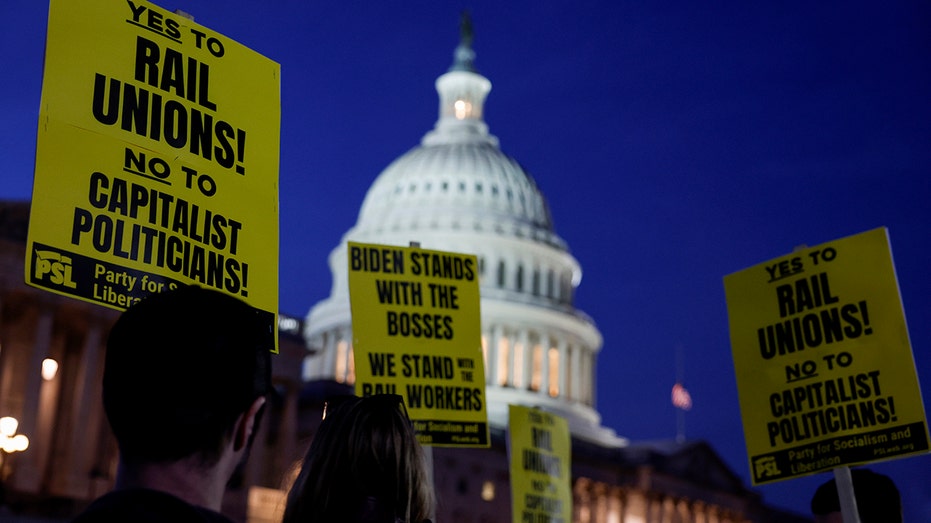Rail union president on House bill forcing labor deal: We told Congress to 'stay out of the process'
House passes legislation Wednesday avoiding US rail union strike
How Congress can ‘solve’ the rail problem
Brotherhood of Railroad Signalmen President Michael Baldwin discusses Congress' involvement to avoid a rail strike, arguing a strike is the 'last thing' the industry wants.
Following the House’s approval of legislation averting a nationwide rail strike, the president of one of America’s largest rail unions is signaling its members would’ve liked to have seen negotiations through to the end.
"We had initially indicated to Congress that we would like for them to stay out of the process, that we would like for them to allow us to complete our process under the Railway Labor Act," Brotherhood of Railroad Signalmen President Michael Baldwin said on "Mornings with Maria" Thursday.
By a 290-137 vote, House lawmakers voted Wednesday to pass legislation blocking nearly 100,000 railroad workers from striking in early December. Economists and the White House have warned that a railroad strike could paralyze the nation's economy ahead of the holiday season.
"We must act to prevent a catastrophic strike that would touch the lives of nearly every family," said House Speaker Nancy Pelosi, D-Calif.
HOUSE PASSES BIDEN-BACKED BILL TO AVERT RAIL STRIKE
The legislation gives unionized train engineers and conductors three unpaid sick days a year for medical appointments, provided employers are given at least 30 days' notice about the time off. It's based on an agreement that railroad companies and transportation unions agreed to in September. While eight unions have already adopted the agreement, four have not.

The Brotherhood of Railroad Signalmen doesn't "necessarily agree with" the House's legislation averting a union strike, its president Michael Baldwin said on "Mornings with Maria" Thursday, December 1, 2022. (Getty Images)
The Brotherhood of Railroad Signalmen was the second union to reject the original, tentative deal in mid-September, with the "sticking point" being more paid sick time off, according to its president.
"We also understand that Congress has a responsibility to protect the economy. So we know why they're doing it, but we don't necessarily agree with it," Baldwin said. "We initially asked for seven days of sick time based on an E.O. previously for federal contractors. And then we reduced that ask to four days. And neither instance did the railroad even begin to move in our direction, or engage and give us a counteroffer."
Baldwin signaled there are still "humanitarian" issues to solve around sick time, noting that a lack of paid time off also impacts their employers’ ability to maintain staff.
"We had members that were quarantined or forced to quarantine by their employer and not paid for it," the union president criticized. "These people need to have the ability to take a day off if they're sick and not come to work… So sick time, obviously, would be something that would draw people to the industry and want them to stay here along with their other benefits."
Rail strike could be ‘devastating’ for nation's food supply, farmers warn
FOX Business’ Madison Alworth reports from a farm in Monroeville, New Jersey to investigate the negative impact the looming rail strike has had on the farming industry.
Another provision in the House’s legislation approved a 24% raise for employees over a five-year period, with a 14.1% pay increase going into immediate effect upon Senate and presidential passage. But Baldwin pointed out the wage increase won’t keep up with the pace of inflation.
"That 14% falls around 2.5 to 3% below inflation for the first three years. So we're behind the eight-ball in the inflation piece," the president claimed. "As far as the wages, the last two years, we don't know what inflation is going to be yet. So we could still be treading water."
As soon as lawmakers’ proposed deal gets President Biden’s signature, Baldwin says it will be illegal for unions to strike.
"We will all be in the same boat, the same situation if this enforced [Tentative Agreement] bill makes it through and is signed into law," Baldwin said. "Once that's signed into law, it would be illegal to strike."
GET FOX BUSINESS ON THE GO BY CLICKING HERE
House passes bill to prevent railroad strike ahead of holiday shopping season
Florida Rep. Brian Mast reacts to the House approving a bill that would avert a looming railroad workers strike on 'The Evening Edit.'
Arguing that the railroads "ignore the dignity" of their employees and "have been more focused on profits" during negotiations, Baldwin said union representatives are in D.C. to garner support for a supplemental piece of legislation giving railroad workers an additional seven days of sick leave. It remains to be seen if it will be included in the version the 50-50 divided Senate will take up.
"We hope, we really hope, that the senators in this country make the right decision. This is not just about rail employees now, this is about the American people," Baldwin said. "Eighty percent of the companies in this country provide some sort of paid sick time to their employees. We're not asking for anything more than the rest of the country gets."
FOX Business’ Haris Alic contributed to this report.























